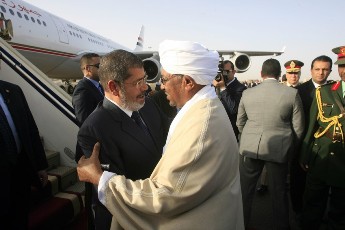Sudan describes death sentence against Egypt’s Morsi as “internal matter”
May 18, 2015 (KHARTOUM) – The Sudanese government has described the decision by an Egyptian court to refer the ousted president Mohamed Morsi to Egypt’s top religious authority to consider death penalty against him as an “internal affair”.

Sudan’s foreign ministry spokesperson, Ali al-Sadig, said in press statements on Monday that “ongoing trials in Egypt are an internal matter and the [Sudanese] government does not interfere in the internal affairs of other countries”.
The government’s reaction contrasted sharply with that of the opposition Popular Congress Party (PCP) led by Hassan al-Turabi who denounced the court’s decision and warned that Egypt would witness a strong internal strife if Morsi and his companions were executed.
In 2013, Khartoum sought to strike a neutral tone following the move by the Egyptian army to overthrow Morsi after unprecedented multi-million strong demonstrations against him before it returned and described it as an “internal affair” that concerns Egypt’s people, national institutions and political leadership.
Morsi is the first president to be referred to the mufti in Egypt’s history. The opinion of the mufti is not binding to the court, but Egyptian law makes it necessary for judges to seek a religious point of view on any death sentence.
The court decision against Morsi and his aides drew condemnation from US, Turkey, Germany and the European Union (EU) with the rights group Amnesty International describing it as “nothing but a charade based on null and void procedure”.
(ST)
